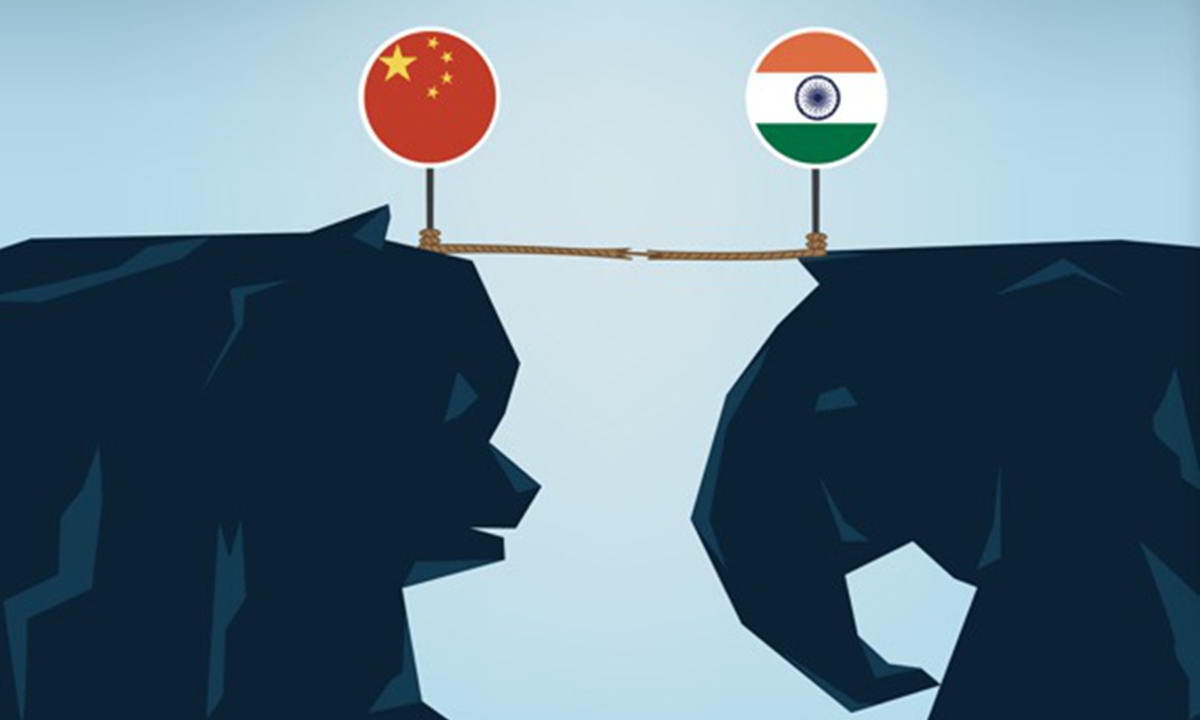Indian strategists should not be kidnapped by nationalism
By Mu Lu Source: Global Times Published: 2020/9/24 21:48:40

Illustration: GT
The China-India border clash that started in May is still ongoing. Many Indian strategy scholars have taken the opportunity to put themselves under the spotlight. They came up with opinions that seem to be rational but exaggerate India's strength. They have been catering to the burning nationalism within India. They are following the trend of hard-line domestic public opinion. That's all.
Brahma Chellaney, professor of Strategic Studies at the New Delhi-based Center for Policy Research, is one of the Indian strategists who have blinded themselves. In his recent article, "China Is Paying a High Price for Provoking India," Chellaney analyzed China's "miscalculation" against India in a seemingly serious manner.
He said, "China is not equipped to dominate India in a military confrontation." To prove his argument, he noted that Indian troops had "occupied strategic mountain positions overlooking key Chinese deployments on the southern side of Pangong Lake." Chellaney said so with certainty, as if he were there observing what had really happened.
However, based on what we know, the brave soldiers of the People's Liberation Army (PLA) didn't pay much attention to the threats from Indian troops, and drove them away from the highlands. The PLA has gained advantageous positions in the standoff.
Chellaney described Indian soldiers as "battle-hardened forces" who can handle the PLA. It is not surprising at all for him to think so. A BBC Chinese report said Indian media reports about the border clash have relied on official information from the Indian government, or sources in security departments. The Indian media outlets cannot independently verify the official statements, so most of their reports' content was speculative.
Indian media outlets follow New Delhi, so they portray China as an invader who disregards bilateral ties, international rules and conventions. If one is surrounded by and imbued with such self-deceiving information, how can we expect him to make a rational judgment?
A strategist with vision should never blindly boast about the strength of his own country, especially when facing an overwhelming opponent. It is very important for a strategist to keep a sober head even when others are dazzled by nationalism. As a veteran strategist like Chellaney is still unable to escape the fate of following the trend, it is not surprising that a group of Indian strategists are short-sighted when looking at China-India relations.
Worse, they have recklessly poured gasoline on fire: Their misjudgment has forced Indian troops to bluff at the border and to engage in a mission they are not able to accomplish. These so-called scholars have actually sacrificed the Indian army for rising nationalism.
Indian people should really take a good look at today's world and today's China. They also need to carefully study history. To confront China, India is playing with fire. In the long run, the arguments that lack strategist vision will only jeopardize India's efforts to pursue major power status.
Catering to nationalist sentiment can bring only temporary fame to scholars. But the long-time collusion of nationalist public opinion and a lack of strategic vision will only make Indians out of touch with reality. This being the case, the Indian government will be further kidnapped by nationalism and eventually drown in such extreme sentiment. It is likely that India cannot afford such a painful price.
Posted in: OBSERVER